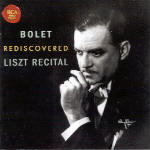Admirers of the late Jorge Bolet will rejoice in this newly discovered Liszt recital, recorded for RCA in 1972. According to reissue producer Jon Samuels, the plan was to record additional Liszt material in order to fill several LPs. For some reason, the project was abandoned and the tapes forgotten about until Samuels stumbled upon them by accident. While all but one of the selections are already represented in Bolet’s discography, the RCA versions on the whole are more assertive and inspired, sharper in character, and fluidly phrased. There are no major interpretive differences, to be sure, yet certain details stand out to the present recording’s advantage.
Un Sospiro’s climax builds to grander, more impulsive effect, while Funérailles’ central octave section is shaped with added drama and dynamism. If La Campanella and Gnomenreignen don’t quite scintillate in Bolet’s unhurried hands, the pianist shades them more playfully than in his relatively stolid Decca remakes. Notable too are Bolet’s ruminative, full-bodied Waldesrauschen and Liebestraum No. 3. While the RCA Grand Galop Chromatique is far superior to Bolet’s earthbound Decca version, he never really lets go as he did in the presence of an audience (my memory is backed up by existing “private” concert tapes). In and of itself, Bolet’s Spanish Rhapsody (a work he otherwise didn’t record) is valuable for its elegance, poise, and patiently detailed passagework. Yet again, I miss the abandon and fire he brought to his live performances.
On the other hand, an unissued 1973 studio run-through of the Wagner-Liszt Tannhäuser Overture pales beside the pianist’s superior live Carnegie Hall rendition taped by RCA the following year. Once past the noble opening pages, Bolet gets rhythmically bogged down in the middle section, and the scampering woodwind patterns lack the crispness and definition of his later live version. I wager that Bolet was either learning this piece or bringing it back into his repertoire and had not fully internalized its intricate patterns. In fairness, Bolet’s run-through was recorded on the fly, so to speak, and never intended for issue. I doubt Bolet would have sanctioned its release now. Then again, Bolet approved some of his most enervated late Decca products. Who knows? All told, Bolet’s 1972 RCA Liszt sessions represent a major find in the annals of pianophilia.
































